Our Philosophy
The mission of the Rowland Foundation is to invest in Vermont teachers in order to positively change the culture and climate of schools. While culture and climate are closely related, they are not the same thing. Culture consists of the shared values, expectations, and ways of being in a school community. Climate is the way members of the school community perceive and experience these norms.
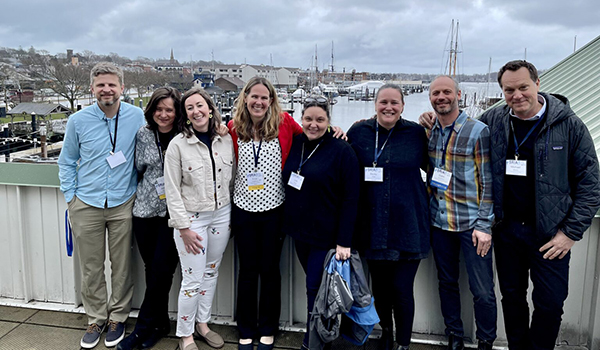
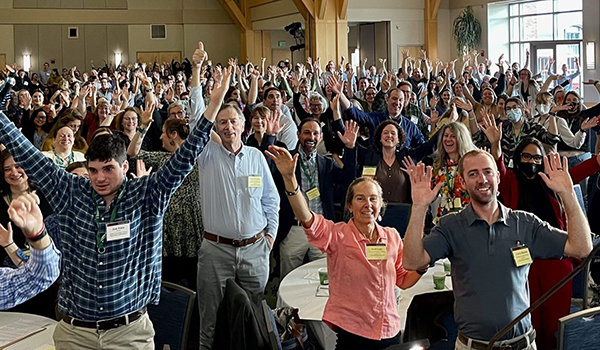
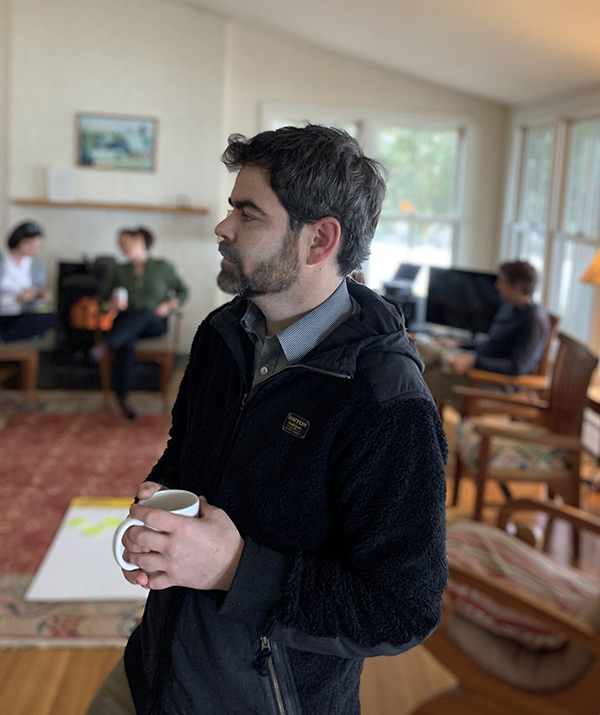
Culture and climate are often believed to be subjective, ineffable even. However, nothing is more tangible, more real, than a school community’s culture and climate.
“You can tell a school’s culture and climate as soon as you walk in the door,” Rowland Foundation Founder & Past Executive Director Chuck Scranton often says. Culture and climate can be seen, heard, and felt everywhere in a school. Culture and climate show up in the messages and artwork on the walls, and in the way physical spaces are laid out, assigned, and controlled. You can tell a school’s culture and climate by hearing how students speak to each other, how teachers and students interact, and how the “support staff” are addressed. A school’s culture and climate are defined by the types of questions being asked, by the books on display, and by the way the course catalog grants access (or doesn’t) to learning. Culture and climate are also revealed in the way that classrooms are configured, in the assignment of different wings of the school to different purposes, and in the ease with which school community members can pass through these spaces, or even access natural light and the outdoors.
At the Rowland Foundation, we believe that a healthy, positive school culture and climate are reflected in the following benchmarks:
- Teachers are lifelong learners who continuously seek out professional learning.
- Teachers know their work makes a difference in the lives of all of their students.
- Teachers learn from each other, and their students, on a daily basis.
- Students and staff feel a sense of belonging and pride in their school.
- Students and staff experience joy in their school day.
- Students and staff voices are heard and shape the direction of their school.
- Students and staff demonstrate an ethic of care for each other.
- Students and staff are able to show up as their authentic selves.
- Students show agency in their learning.
- There are high expectations for all students.
- There is a sense of community within the school.
The Rowland Foundation believes that systemic change, the kind that can alter a school’s culture and enhance its climate for learning, is derived from visionary leadership within the school. Deep and lasting change of this kind cannot be mandated, downloaded, or implemented in a linear fashion — it must be co-constructed with all the members of a school community. Transformational change comes from meaningful, sustained collaboration between teachers, students, school leaders, and local community partners.
The Rowland Foundation believes that teacher leadership, innovation, and collaboration lead to positive change. To this end the Rowland Foundation will offer up to six fellowships to Vermont secondary or middle grades teachers each year. The Foundation seeks proposals in which a teacher and the principal/head of school form a clear partnership to improve an element of the school which will profoundly impact students by enhancing the institution’s culture and climate. The Rowland Fellow will assume the key leadership role in the initiative’s development and realization with support from the Rowland Foundation.
The Rowland Foundation Theory of Action
If the Rowland Foundation invests in teachers as Rowland Fellows, they will be well positioned to positively change culture and climate at the ground level working with colleagues, students, administrators, and community members.
If the Rowland Fellowship focuses on a specific school site, it will mobilize local community members and assets in order to have a significant impact.
If Rowland Fellows share experiences, resources, and strategies through the cohort model, their work will be strengthened and informed by new learning from other school communities.
If opportunities are created for Rowland Fellows to continue to share information across cohort years and school communities, we can accelerate the pace of change by learning from innovation across the growing network of Rowland Fellows.
If Rowland Fellows deprivatize their pedagogical practice and disseminate new learning from across the network of Rowland Fellows, at the Annual Rowland Conference, in publications, and in communications, schools across Vermont will benefit from open collaboration and innovation in the areas culture and climate.
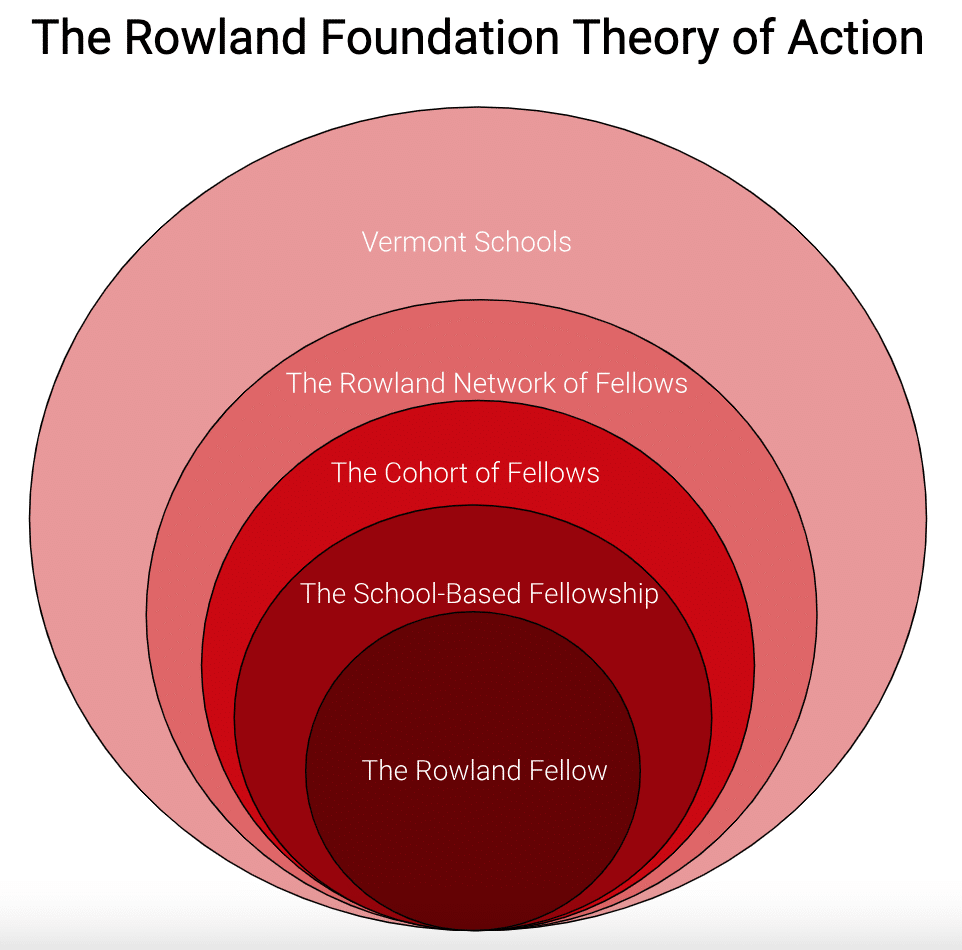
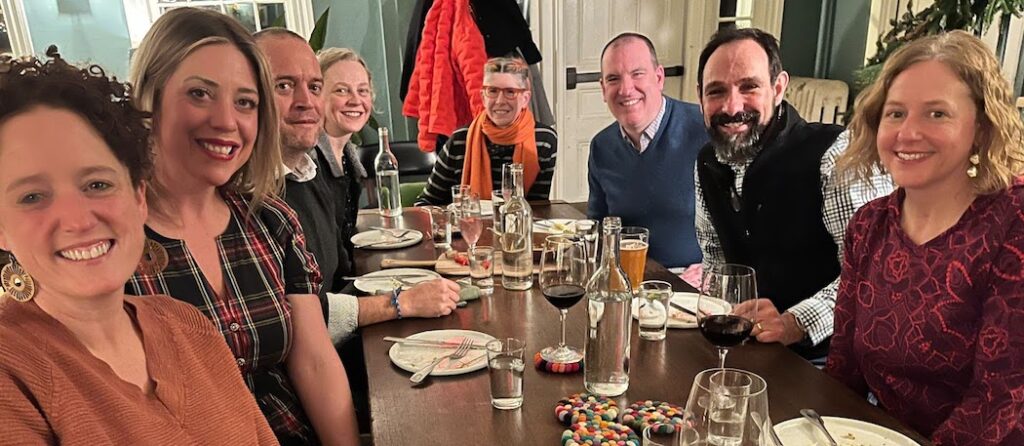
The Rowland Approach
Guiding Principles & Change Strategies
School culture and climate are closely connected to student outcomes. That’s why our mission statement reads, “The Rowland Foundation invests in Vermont teachers to positively change the culture and climate of schools.” The Rowland Foundation’s mission focuses on school culture and climate because these factors profoundly impact students’ growth and success in their formative years.
While culture and climate are closely related, they are not the same thing. Culture consists of the shared values, expectations, and ways of being in a school community. Climate is the way members of the school community perceive and experience these norms. Culture and climate are often believed to be subjective, ineffable even. However, nothing is more tangible, more real, than a school community’s culture and climate, and intentional decisions about a school’s routines, practices, and structures can positively change culture and climate.
The Rowland Foundation believes in teacher leadership, collaboration, and innovation. That’s why we invest up to $600,000 in Rowland Fellowships for Vermont teachers each year. Over 100 Vermont middle and secondary grades teachers have been awarded Rowland Fellowships at over 45 schools around the state. The most important part of a Rowland Fellowship is the “gift of time”, in other words, the release from classroom duties to do a different type of work for the school, including but not limited to: research, travel, facilitation, community engagement, communications, and project management. Rowland Fellows work in close partnership with their principal, colleagues, students, and community members to cultivate a shared vision for change at their schools.
Each year, the Rowland Foundation puts out a statewide call for Fellowship proposals, and each year dozens of teachers send us their original ideas for systemic change at their local schools with culture and climate in mind. Rowland Fellows participate in a two-year cohort cycle with other Rowland Fellows from the same year, supported by two Senior Rowland Associates. In a recent survey, the words that Rowland Fellows most often used to describe their Rowland Fellowship experience were: transformative, inspiring, empowering, life-changing, and challenging. Immediately after their Rowland Fellowships, a majority of Rowland Fellows return to their teaching or counseling positions to work directly with students. However, over time, and after the powerful experience of leading school change work during their Fellowship, approximately 50% of Rowland Fellows eventually move into leadership positions, most often as coaches, coordinators, directors, principals, assistant principals, superintendents, or curriculum directors.
If the smartest person in the room is the room…we need to get together! That is why every Rowland Fellow is part of a close-knit cohort of colleagues from other schools who are also working on a Rowland Fellowship that year. Each Rowland Cohort meets in person for a full day every other month. The Cohort is an intentionally designed space that allows Rowland Fellows to share successes, challenges, ideas, and questions as they engage in their Fellowship work. It is also a venue for Fellows to hone the collaborative practice skills they will bring back to their school change work. The Cohort is a place where Rowland Fellows reflect on their membership in various communities, as well as how the way we show up shapes culture and climate. The Cohort is a space where authenticity, humility, vulnerability, and generosity are all important values.
Over time, we have learned that the Rowland Fellows who develop strong collaborative practice skills have the greatest impact on their school’s culture and climate. Through the Rowland Cohort model, all Fellows are supported by our Senior Rowland Associates to develop their mastery of collaborative practices, including, but not limited to: purposeful agenda development; intentional use of protocols; improved ability to give and receive feedback; heightened awareness of identity markers and how power and privilege show up in groups; a deeper connection to understanding and leveraging meeting agreements; and a stronger reflective practice. All Rowland Fellows now begin their two-year cohort cycle by taking Collaborative Practices for Equity, a graduate level course co-sponsored by the Rowland Foundation and Great Schools Partnership to develop the collaborative practice skills school leaders need to positively change their school’s culture and climate.
Rowland Fellows rely on the full support of their school administrators, which is why every Fellowship application requires an enthusiastic letter of support from the school’s principal. The most successful Rowland Fellowships grow out of a strong, productive partnership between the Principal and Rowland Fellow. This is why the Rowland Foundation hosts a Fellowship Launch each spring for new Rowland Fellows to spend the day with their Principals to do initial vision and planning work. Principals join their Rowland Fellow’s Steering Committee work, including for the daylong Shared Leadership Retreat which is hosted each fall by the Rowland Foundation. Rowland Principals are also invited to attend the Annual Rowland Dinner & Reception to acknowledge the honor of a Rowland Fellowship award for their school, and in recognition for the important role they play in making a Rowland Fellowship successful. Rowland Principals understand the power of positive teacher leadership in their schools and help Rowland Fellows bring colleagues together in order to increase internal capacity for schoolwide change.
No Rowland Fellow can succeed on their own. Every Rowland Fellow forms a Collaborative Work Group composed of the school’s students, staff, and community members who help design, promote, and implement the schoolwide change idea brought forward by the Rowland Fellow. All Rowland Fellows meet at least monthly with their Collaborative Work Group to incorporate new ideas into their Fellowship proposal as the work advances. When students, staff, and community members all play a significant role in the design and implementation process, the end result is always better conceived and better received by the entire school community. In addition to the Collaborative Work Group, some Rowland Fellows convene an Advisory Committee, composed mainly of members of the wider community, which meets less frequently. Advisory Committees help mobilize community assets and bring a broader range of perspectives to the Fellowship work. Some Rowland Fellows and Principals acknowledge that the collaborative structures put in place for the Fellowship had as big an impact on culture and climate as the proposal itself. Sometimes the process is the product! Simply put, lasting school change can only happen when students, staff, and community members make significant contributions to the work.
Despite landmark court decisions and legislation in the past century (for example, Brown v. Board of Education, the Individuals with Disabilities Education Act, and the Vermont Supreme Court’s Brigham decision, which led to statewide education finance reform), equity in education remains elusive. Most educators agree that schools still have plenty of work ahead in order to become equitable learning environments for all students.
The Rowland Foundation’s mission to positively change the culture and climate of schools recognizes the need for deep and enduring change in order to serve the democratic mission. The Rowland Foundation invests in teachers to lead systemic school change and operates from a belief that we need to question the structures of school curriculum, procedures, and daily schedules instead of focusing on individual students’ successes or challenges.
To that end, the Annual Rowland Conference, which is the largest educational conference in Vermont, brings together over 400 teachers, students, administrators, school board members, policymakers, and community members every year. The purpose of the Annual Rowland Conference is to question outdated school models, share new innovation from the field, and reaffirm a shared commitment to the democratic mission of school. The conference’s nationally recognized keynote speakers and Vermont-based workshop presenters offer a compelling vision each year for systemic school change with equity and inclusion in mind. Through its investments in teacher leadership and its annual conference, the Rowland Foundation advances strategies for equitable and systemic change in Vermont schools.
It would seem obvious that teaching is a profession. After all, teachers hold advanced degrees, do complex interpersonal and intellectual work, and operate with a great deal of autonomy. And just like doctors and lawyers, educators are expected to continuously improve their expertise over the course of their career, including by staying current with new changes coming from science or statute. However, despite all of these similarities, and despite the critical work teachers do, they are simply not valued in our society in the same way that we value doctors and lawyers.
The Rowland Foundation believes that teachers deserve the same respect as professionals in other fields. The Rowland Fellowship is a unique vote of confidence in teachers’ ability to identify systemic needs, develop a compelling vision for change, and lead a local coalition to positively change school culture and climate. It is also important to note that the teacher leadership role required by a Fellowship can be considered a career ladder in certain respects, in other words, a channel for professional growth beyond the classroom/administration binary. “The Fellowship year gave me the room to try something really different, to experiment, and then to apply my ideas in school,” one Rowland Fellow explains. The Annual Rowland Conference is one example of how we elevate teachers’ insights, showcase their work, and disseminate new learning to benefit their fellow professionals in the field of education. The Annual Rowland Dinner is yet another way that we honor teachers. This annual award ceremony is hosted by the Rowland Foundation to celebrate new Rowland Fellows with a semi-formal dinner and reception where Fellows’ spouses and Principals are invited as guests of honor to mark the occasion.
Here are the words used by Rowland Fellows to describe what they especially appreciated about their experience with the Rowland Foundation:
“The vote of confidence and trust placed in me as a potential educational change leader”
“The whole-hearted trust in Fellows and unconditional support is so unique and refreshing for educators.”
“The high level of trust and confidence in me as a professional”
“The support and feeling like my thoughts were valued”
“The empowerment of classroom educators”
In a moment where teachers are leaving the profession because they don’t feel respected or supported, the Rowland Foundation’s recognition of teachers’ innovation and significant contributions to the field of education seems more important than ever.
With over a hundred Rowland Fellows now working as teachers or school leaders across the State, the Rowland Foundation has created a new grant strategy to support regional work. The new Rowland Encore Grant provides the opportunity for veteran Rowland Fellows to collaborate across districts on a change initiative of regional or statewide importance. The grant allows a team of four veteran Rowland Fellows to conduct research and convene at a site of their choosing for in-depth work on their project focus, with a specific product in mind. Teams may choose to co-author white papers, field guides, resource collections, short films, or other products that can be used in schools by other educators interested in positively changing school culture and climate (e.g., recent teams focused on digital wellness and deeper learning, respectively). This new grant strategy reflects a commitment by the Rowland Foundation to teacher-led change, innovation through collaboration, and collective impact across school communities.
Women leaders face challenges that men do not, and the field of education is no exception. One way that the Rowland Foundation supports women leaders in the field of education is through its Rowland Women Leadership Retreat. With annual support from the Rowland Foundation, veteran Rowland Fellows who are women organize a two-day retreat each spring to create an affinity space for expert facilitators, shared physical activities, and communal meals. The retreat is intended to be restorative, and is also a place for women leaders to share experiences and insights from their work in education.
There is a growing body of research showing that all students benefit from having a teacher of color, and yet teachers of color are still underrepresented in the Vermont educator workforce. Put simply, the Vermont student population is more diverse than its teachers, which means that many Vermont students will never have a teacher who looks like them. In response to the ongoing need for educators of color in Vermont, the Rowland Foundation has created a new grant called the Diversifying the Educator Workforce (DEW) Grant. Recognized by the Rowland Foundation as DEW Scholars, each year, up to four aspiring Vermont educators of color receive up to $20,000 each to help pay for costs related to teacher licensure such as coursework, PRAXIS exams, certificate programs, internship fees, peer review, transcript review, and/or licensing fees. DEW Scholars also participate in a small cohort with a DEW Grant Mentor who advises and provides support with their individual pathways to licensure.
Teachers are designers by nature. Teachers are always tweaking lessons, trying out new techniques, taking in feedback, experimenting with new technology, testing out new resources…and then refining their work all over again. All this makes teachers terrific innovators. That’s why the Rowland Foundation created Rowland Leadership Grants, which are small grants for veteran Rowland Fellows to keep innovating after completing their Fellowship work. Keep innovating and keep collaborating, Teachers!
“The best learning at a conference often happens after the workshops over a drink with colleagues,” Rowland Foundation Founder Chuck Scranton likes to say. In order to create space for imagination, joy, and human interaction, the Rowland Foundation hosts the All Fellows Retreat & Social each year on the day before the Annual Rowland Conference. This annual convening is an opportunity for colleagues to share innovative ideas in education from around the State (and beyond). The event also brings together Rowland Fellows from across cohorts, across school districts, and across disciplines to strengthen relationships and create new connections across one of Vermont’s most vibrant and generous educator networks.
Pedagogy of the Oppressed, Paulo Freire (1968)
Inciting Joy: Essays, Ross Gay (2022)
The Mindfulness Essentials Series, Thich Nhat Hanh (2016)
Unearthing Joy: A Guide to Culturally and Historically Responsive Curriculum and Instruction, Gholdy Muhammad (2023)
The Courage to Teach: Exploring the Inner Landscape of a Teacher’s Life, Parker J. Palmer (1997)
The Listening Leader: Creating the Conditions for Equitable School Transformation, Shane Safir (2017)
School Reform Initiative
Troublemakers: Lessons in Freedom from Young Children at School, Carla Shalaby (2017)
Braiding Sweetgrass: Indigenous Wisdom, Scientific Knowledge and the Teachings of Plants, Robin Wall Kimmerer (2015)
Margaret J. Wheatley